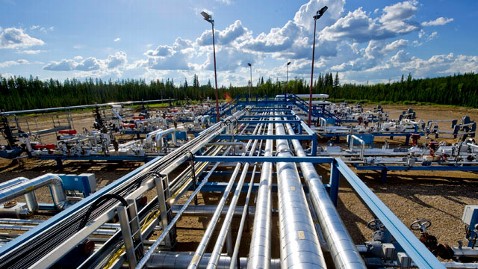Keystone XL Pipeline Does Little Environmental Harm, US Finds By Devin Dwyer
Mar 1, 2013 6:19pm

An oil tar sands processing facility in Alberta, Canada. Jimmy Jeong/Bloomberg via Getty Images.
The Obama administration today moved one step closer to approval of the Keystone XL pipeline, concluding in a draft environmental impact statement that the project would not accelerate global greenhouse gas emissions or significantly harm the natural habitats along its route.
The report, done by the State Department, suggests that the proposed 875-mile pipeline, which would carry 830,000 barrels of crude oil per day from the tar sands of Alberta, Canada, to Steele City, Nebraska, has cleared a significant hurdle on its way to President Obama’s desk for final consideration.
“The approval or denial of any one crude oil transport project, including this proposed project, really remains unlikely to significantly impact the rate of development of the oil sands or the continued demand for heavy crude oil in the U.S.,” said Kerri-Ann Jones, the Assistant Secretary of State for Oceans and International Environmental and Scientific Affairs.
The State Department, which conducted the study because the pipeline would cross an international boundary, also suggested in a voluminous report that impacts on air, water and landscape would be minimal.
The agency found it “very unlikely” that the pipeline would affect water quality in any of the four aquifers through which it crossed. It also concluded that along one part of the proposed route, in the case of a large-scale oil spill, “these impacts would typically be limited to within several hundred feet of the release source, and would not affect groundwater.”
Government analysts found that Keystone XL would each year produce the equivalent carbon dioxide emissions of 620,000 passenger cars operating for a year. But they concluded that whether or not the pipeline is approved, those emissions would still likely occur because of fuels produced and obtained from other sources.
The release of the draft report reignited debate over climate change and President Obama’s pledge to do something about it.
Environmental activists have been lobbying Obama hard to block the plan — some recently chaining themselves to the White House fence in protest. Many environmental groups see rejection of the pipeline as a litmus test for whether Obama intends to fulfill his pledge from the second inaugural.
“It seems like Secretary Kerry and the State Department missed President Obama’s State of the Union and inaugural address,” said Erich Pica, president of Friends of the Earth. “The draft SEIS reads like an on-ramp to justify the Keystone XL pipeline project. We cannot solve the climate crisis when the State Department fails to understand the basic climate, environmental and economic impacts of the Keystone XL pipeline.”
Pica and other environmental advocates have called the pipeline a “carbon bomb,” increasing the use of tar sands oil, which is one of the dirtiest to produce and transport.
The oil industry, some members of Congress, and the nation’s major labor unions, which stand to gain construction jobs with the pipeline’s approval, all welcomed the news.
“No matter how many times KXL is reviewed, the result is the same: no significant environmental impact,” said Marty Durbin of the American Petroleum Institute, the oil industry lobby.
“The latest impact statement from the State Department puts this important, job-creating project one step closer to reality,” he said. “The last approval needed is by President Obama, and we urge him to do so as soon as possible.”
Canada, which has long lobbied the U.S. for approval of the deal, also hailed the State Department’s report as a step forward.
“The Keystone XL pipeline will create tens of thousands of jobs on both sides of the border,” said Canadian natural resources minister Joe Oliver.
In 2011, the Obama administration came close to approving an earlier version of the Keystone XL pipeline, which would have stretched from Alberta to the Gulf of Mexico. The deal was tabled after a dispute over the portion of the route through Nebraska, though officials later green-lighted construction of the southern portion of the pipeline.
Nebraska, Montana and South Dakota have now all signed-off on the pipeline plan and their governors and congressional delegations have been calling on Obama to follow suit.
One potential wild card: new Secretary of State John Kerry, a longtime advocate of action to combat climate change. He will play an influential role in finalizing the department’s review and recommendation before presenting it to Obama, who has said he’ll make the final call.
No comments:
Post a Comment